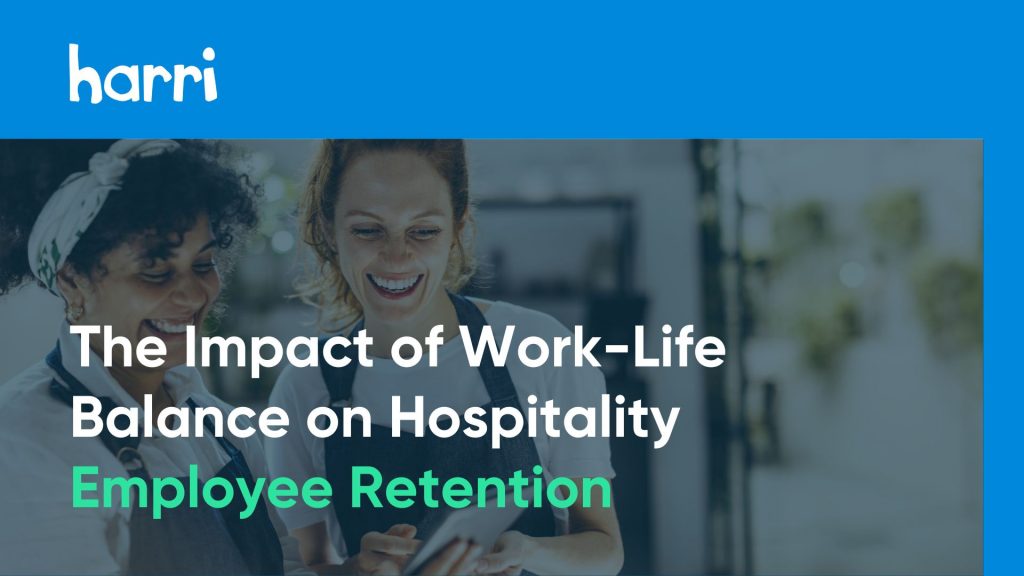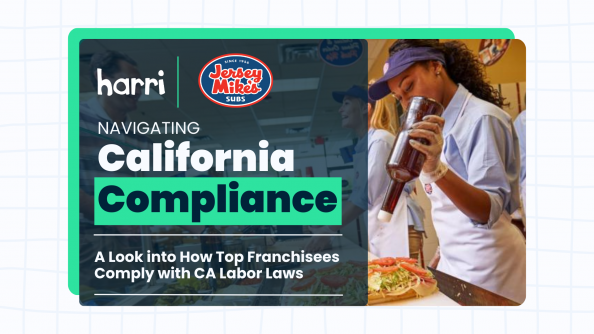The Impact of Work-Life Balance on Hospitality Employee Retention

- By Harri Insider Team | June 4, 2024
Essential Strategies and Insights
Work-life balance in the hospitality industry is an elusive concept. One of the most popular search terms in the field is “What is work-life balance”?
It’s a concept that’s essential for hospitality leaders to understand because it really matters to staff. In a landscape that is far from 9 to 5 – and still dealing with a serious labor shortage – savvy hospitality companies have figured out that they need to help employees find better balance if they want to keep top talent around.
In this article, we’re exploring work-life balance in the hospitality industry, and offering some actionable advice for prioritizing employee development and happiness.
Work-Life Balance in the Hospitality Industry
Work-life balance isn’t easy to achieve in any industry, but it’s especially tough in the hospitality field for a few different reasons:
- Sporadic scheduling – It won’t come as a surprise to anyone who has worked in hospitality to know that the schedule requirements of the industry pose serious challenges. Most people do not work Monday – Friday, and shifts can vary between morning, afternoon, evening, and night-time. The worker shortages and constant shift swapping make things irregular and can be frustrating.
- Worker shortage – Compared to 2020 levels, the hotel industry is still facing a shortage with about 500,000 open positions. This means most establishments are short-staffed, putting high pressure on current employees and leaving them with limited downtime.
- Employee turnover – Some studies point to a turnover rate of about 84% in the hospitality industry, compared to less than 50% in other areas. For a variety of reasons, hotels and restaurants are particularly susceptible to high turnover rates, which has a huge impact on the employees who remain.
- High-pressure environments – The hospitality industry comes with some lofty customer expectations and it tends to happen in a fast-paced atmosphere. Workers are often judged based on their speed or customer satisfaction. Hospitality workers are trained to handle a high volume of tasks and provide excellent service under pressure.
- Limited flexibility – The nature of hospitality jobs means that, for the majority of the workforce, workers need to be physically present for their shifts. While much of the world is now taking advantage of working from home or flexible hour arrangements, hospitality workers can’t usually make the most of these benefits.
The good news is that these challenges are being noticed, and smart organizations are looking for ways to not only improve overall work-life balance but to further develop and invest in hospitality employees.
For example, many hotel chains (such as Marriott International) have started initiatives designed to prioritize employee development. The “Marriott Management Development Program” helps employees to hone their leadership skills and advance their careers. Companies that invest in their employees are more likely to keep them, and supporting your staff in achieving better work-life balance is one of the best investments you can make. In fact, 85% of companies who invest in work-life balance programs report increased productivity and have 50% lower healthcare costs.

Strategies for Improving Work-Life Balance in the Hospitality Industry
If you understand the importance of supporting work-life balance for your team, but just aren’t sure how, you aren’t alone. These tactics can help hospitality managers to engage and educate their employees, leading to better balance and long-term satisfaction in a hospitality role.
- Increase engagement with dedicated tools – Today’s technology can be extremely valuable when it comes to engaging your team. For example, you can use Harri’s communications platform to implement a special engagement program for new hires’ first 90 days. You can also use it to share important announcements or updates and to celebrate special milestones in an employee’s life. What better way to let your employee know that you hope they enjoy their honeymoon, than by sending them off with a personal message?
- Improve communication with colleagues – Properly communicating with your team is huge in making them feel valued and limiting frustration. Harri is a powerful tool that centralizes messaging and announcements and facilitates two-way conversations with your staff. Use it to set up group message channels that encourage collaboration and upload a variety of media. You can even create custom message groups or news feeds based on things like role, responsibility, or location.
- Be as flexible as the position allows – Flexibility might sound like a myth in the hospitality industry, but the truth is there is almost always some wiggle room to accommodate workers. What can you do to better help staff meet their unique needs and preferences? Sometimes, even simplifying the process of swapping shifts can go a long way. Enable your team’s autonomy with automatic, direct, or pick-up shift functionality for employees, and encourage them to use the TeamLive app to trade shifts on the go. It’s also a good idea to expand onboarding so that workers have an understanding of other roles that may interest them in the future, and see a career path that may be different from their current one.
- Simplify scheduling – Scheduling is certainly a pain point for a majority of hospitality workers. If you can streamline this process, you’ll have happier workers and more coverage. Harri’s intelligent employee scheduling platform accounts for all external and internal factors to create truly labor-efficient staff schedules. Managers can automatically generate position-based, skill-based, or performance-based schedules, and build optimal shift structures that calculate predicted demand based on historical sales data, employee availability, local and federal labor laws, and other custom factors. This means employees are more likely to have a schedule that meets their needs, and they have more options when a shift won’t work for them.
- Lead by example and recognize work-life balance – If business leaders never take time for themselves and don’t model healthy behaviors, then they can’t expect their employees to. Do your best to demonstrate a good work-life balance by taking your regular breaks, leaving work on time, and prioritizing time off. If you do these things, your team will feel more comfortable doing the same. Make a point of being excited for people when they take time off for a vacation or downtime. You may also consider incentivizing strong performance with time-off-related rewards, such as an extra half-day or day of leave as a reward for for achieving monthly sales goals. Make commitments to help them have more personal time, and stick to them.
Boosting your team’s work-life balance will pay dividends. Investing in the tools that make life easier for your staff is an investment in them – one that will keep with you for years to come. Make sure to follow Harri’s blog for more tips, trends, and tech advice specifically for the hospitality industry.
Enhance Your Workforce with Harri
Ready to transform work-life balance in your hospitality business? Discover how Harri’s innovative tools and solutions can help you improve employee engagement, streamline scheduling, and boost overall satisfaction. Contact us today to learn more and take the first step towards a healthier, happier workforce.





















